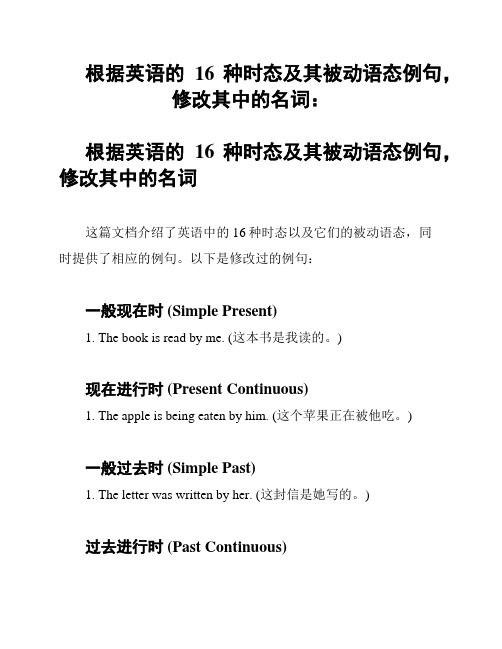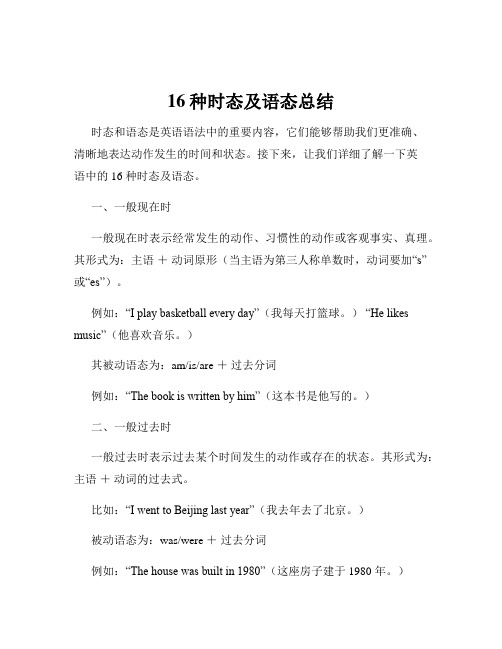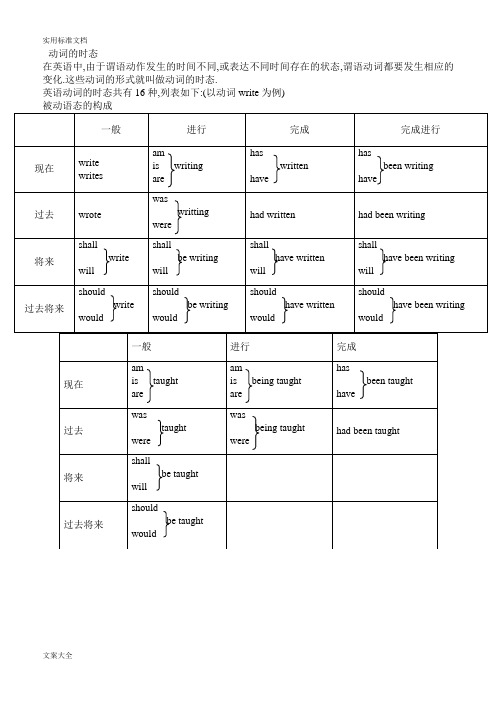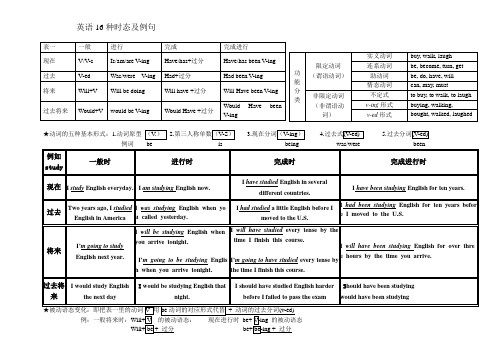英语的16种时态及其被动语态例句
根据英语的16种时态及其被动语态例句,修改其中的名词:

根据英语的16种时态及其被动语态例句,修改其中的名词:根据英语的16种时态及其被动语态例句,修改其中的名词这篇文档介绍了英语中的16种时态以及它们的被动语态,同时提供了相应的例句。
以下是修改过的例句:一般现在时 (Simple Present)1. The book is read by me. (这本书是我读的。
)现在进行时 (Present Continuous)1. The apple is being eaten by him. (这个苹果正在被他吃。
)一般过去时 (Simple Past)1. The letter was written by her. (这封信是她写的。
)过去进行时 (Past Continuous)1. The cake was being baked by them. (这个蛋糕当时正在被他们烤。
)将来一般时 (Simple Future)1. The concert will be attended by us. (这场音乐会将被我们参加。
)将来进行时 (Future Continuous)1. The report will be being written by him. (这份报告将会正在被他写。
)现在完成时 (Present Perfect)1. The movie has been watched by them. (这部电影已经被他们看过。
)过去完成时 (Past Perfect)将来完成时 (Future Perfect)1. The work will have been finished by tomorrow. (这项工作到明天将已经被完成。
)现在完成进行时 (Present Perfect Continuous)1. The book has been being read by her for hours. (这本书她已经读了几个小时了。
16种时态及语态总结

16种时态及语态总结时态和语态是英语语法中的重要内容,它们能够帮助我们更准确、清晰地表达动作发生的时间和状态。
接下来,让我们详细了解一下英语中的 16 种时态及语态。
一、一般现在时一般现在时表示经常发生的动作、习惯性的动作或客观事实、真理。
其形式为:主语+动词原形(当主语为第三人称单数时,动词要加“s”或“es”)。
例如:“I play basketball every day”(我每天打篮球。
)“He likes music”(他喜欢音乐。
)其被动语态为:am/is/are +过去分词例如:“The book is written by him”(这本书是他写的。
)二、一般过去时一般过去时表示过去某个时间发生的动作或存在的状态。
其形式为:主语+动词的过去式。
比如:“I went to Beijing last year”(我去年去了北京。
)被动语态为:was/were +过去分词例如:“The house was built in 1980”(这座房子建于 1980 年。
)三、一般将来时一般将来时表示将来要发生的动作或存在的状态。
常见形式有:will +动词原形;be going to +动词原形。
例如:“I will visit my grandparents next week”(下周我将看望我的祖父母。
)“She is going to have a party”(她打算举办一个聚会。
)其被动语态为:will be +过去分词;be going to be +过去分词例如:“The meeting will be held tomorrow”(会议将在明天举行。
)“The sports meeting is going to be cancelled”(运动会将要被取消。
)四、过去将来时过去将来时表示从过去的某一时间来看将来要发生的动作或存在的状态。
其形式为:would +动词原形;was/were going to +动词原形。
16种时态及语态总结

16种时态及语态总结在英语学习中,时态和语态是非常重要的语法点。
掌握好这 16 种时态及语态,对于准确表达意思、理解英语句子的含义至关重要。
下面我们就来详细了解一下这 16 种时态及语态。
一、一般现在时(Simple Present Tense)一般现在时表示经常发生的动作、习惯性的动作或者客观事实、真理等。
其结构为:主语+动词原形(当主语为第三人称单数时,动词要加“s”或“es”)。
例如:“I play football every weekend”(我每个周末踢足球。
)“He likes music”(他喜欢音乐。
)一般现在时的被动语态(Simple Present Passive Voice)结构为:am/is/are +过去分词。
例如:“The room is cleaned every day”(这个房间每天都被打扫。
)二、一般过去时(Simple Past Tense)一般过去时表示过去某个时间发生的动作或存在的状态。
其结构为:主语+动词的过去式。
例如:“I went to Beijing last year”(我去年去了北京。
)一般过去时的被动语态(Simple Past Passive Voice)结构为:was/were +过去分词。
例如:“The book was written by him”(这本书是他写的。
)三、一般将来时(Simple Future Tense)一般将来时表示将来要发生的动作或存在的状态。
其结构有多种,常见的有:will +动词原形、be going to +动词原形。
例如:“I will visit my grandparents tomorrow”(我明天将去看望我的祖父母。
)“She is going to have a party next week”(她下周要举办一个派对。
)一般将来时的被动语态(Simple Future Passive Voice)结构为:will be +过去分词、be going to be +过去分词。
英语16大时态及8种被动语态

动词的时态在英语中,由于谓语动作发生的时间不同,或表达不同时间存在的状态,谓语动词都要发生相应的变化.这些动词的形式就叫做动词的时态.英语动词的时态共有16种,列表如下:(以动词write为例)被动语态的构成一般进行完成完成进行现在writewritesamis writingarehaswrittenhavehasbeen writinghave过去wrote waswrittingwerehad written had been writing将来shallwritewillshallbe writingwillshallhave writtenwillshallhave been writingwill过去将来shouldwritewouldshouldbe writingwouldshouldhave writtenwouldshouldhave been writingwould一般进行完成现在amis taughtareamis being taughtarehasbeen taughthave过去wastaughtwerewasbeing taughtwerehad been taught将来shallbe taught will过去将来shouldbe taught would被动语态由助动词be加过去分词构成,时态通过be表现出来.构成被动语态的一般疑问句时,须将第一个助动词移至主语之前,构成被动语态的否定句时,助动词后须加not. 各个时态的被动形式列表如下:(以动词teach为例)英语被动语态讲解语态的基本概念和种类语态是动词的一种形式,用来表明主语与谓语动词之间的关系。
所以英语的语态是通过动词形式的变化表现出来的。
语态有两种:主动语态和被动语态。
主语是动作的发出者为主动语态;主语是动作的接受者为被动语态。
如:They built the bridge.The bridge was built by them.(二)被动语态的构成被动语态由“助动词be+及物动词的过去分词”构成。
英语16种时态及被动语态_表格打印版

英语16种时态及例句★动词的五种基本形式:1.动词原型 (V .) 2.第三人称单数(V -S ) 3.现在分词(V -ing ) 4.过去式(V -ed) 5.过去分词(V -ed)例词 be is being was/were been例如study一般时 进行时 完成时完成进行时现在 I study English everyday. I am studying English now.I have studied English in severaldifferent countries.I have been studying English for ten years.过去Two years ago, I studied English in America I was studying English when you called yesterday.I had studied a little English before I moved to the U.S. I had been studying English for ten years before I moved to the U.S.将来I’m going to study English next year.I will be studying English when you arrive tonight.I’m going to be studying Englis h when you arrive tonight. I will have studied every tense by the time I finish this course.I’m going to have studied every tense by the time I finish this course.I will have been studying English for over three hours by the time you arrive. 过去将来 I would study English the next dayI would be studying English thatnight.I should have studied English harder before I failed to pass the examS hould have been studying would have been studying★被动语态变化:即把表一里的动词V 用be 动词的对应形式代替 + 动词的过去分词(v-ed) 例:一般将来时:Will+ V 的被动语态: 现在进行时 be+ V-ing 的被动语态 Will+ be + 过分 be+ be-ing + 过分功能分类 限定动词 (谓语动词) 实义动词buy, walk, laugh 连系动词 be, become, turn, get 助动词 be, do, have, will 情态动词 can, may, must非限定动词 (非谓语动词)不定式 to buy, to walk, to laugh v-ing 形式 buying, walking,v-ed 形式bought, walked, laughed表一 一般 进行完成完成进行现在 V/V -s Is/am/are V -ing Have/has+过分 Have/has been V -ing 过去 V -ed Was/were V -ing Had+过分 Had been V -ing 将来 Will+VWill be doingWill have +过分 Will Have been V -ing 过去将来Would+V would be V -ingWould Have +过分Would Have beenV -ing。
英语各时态的主动句和被动句

一般将来时(Simple Future):主动语态:明天我将会见我的朋友。
(I will meet my friend tomorrow.)被动语态:我的朋友将被我明天见到。
(My friend will be met by me tomorrow.)主动语态:下个月我将搬到一个新的城市。
(I will move to a new city next month.)被动语态:一个新的城市将被我下个月搬到。
(A new city will be moved to by me next month.)主动语态:明年我将开始学习弹钢琴。
(I will start learning to play the piano next year.)被动语态:学习弹钢琴将被我明年开始。
(Learning to play the piano will be started by me next year.)现在进行时(Present Continuous):主动语态:我正在看电视节目。
(I am watching a TV show.)被动语态:电视节目正在被我观看。
(A TV show is being watched by me.)主动语态:他们正在制定新的计划。
(They are making new plans.)被动语态:新的计划正在被他们制定。
(New plans are being made by them.)主动语态:我们正在等待朋友的到来。
(We are waiting for our friend's arrival.)被动语态:朋友的到来正在被我们等待。
(Our friend's arrival is being waited for by us.)现在完成时(Present Perfect):主动语态:我已经完成了我的工作报告。
(I have finished my work report.)被动语态:我的工作报告已经被我完成了。
(完整版)各种时态的被动语态举例
各种时态的被动语态举例(以动词do为例)1.一般现在时(am/ is/ are +done)English is spoken by lots of people in the world. 世界上的许多人都说英语。
Class meeting is held every Thursday. 每周四都举行班会。
The classroom is cleaned by the students every day. 学生们每天都打扫教室。
2.一般过去时(was/ were +done)The cup was broken by the boy. 杯子被那个男孩打碎了。
He was saved at last. 他最终获救了。
My bike was stolen. 我的自行车被偷了。
3.一般将来时与过去将来时(will/ shall be +done; would/should be +done)A speech will be given this afternoon. 今天下午有一个演讲。
A new road will be built next year. 明年要修一条新马路。
I thought thousands of people would be helped. 我认为将有数千人得到帮助。
4.现在进行时与过去进行时(am/ is/ are being +done; was/ were being +done) The machine was being repaired at this time yesterday. 昨天这时,机器正在被修理。
The problem is being discussed now. 问题正在被讨论。
A bus is being pushed by the passengers. 路人正在推一辆公共汽车。
5.现在完成时(have/ has been + done)Two hundred trees have been planted by now. 到现在为止,已经种了二百棵树了。
英语十六种时态表格(附准确例句)
表示将要发生的动作
tomorrow, the day after tomorrow ,next Sunday,
Soon, in a few days, etc
1.主语+ be going to do
例句:Nick is going to study English tomorrow.
2.主语+will/shall+do
Would + not
16、过去将来完成进行时
表示从过去某时刻看,到未来某时刻以前会一直在进行的动作
常用于宾语从句中
例句:He said that Nick would have been studying English for four years by the end of next year.
2.will/shall+not + be + doing
7、现在完成时
过去发生的但是对现在有影响的动作
already, yet, just, ever, recently,in the past few years等,及由for或since引导的时间状语
主语+have/ has +done
(done指动词的过去分词)
(例句:Nick has been studying English since this morning.)
把have/has放在句首。
Have/has + not + been + doing
11、过去完成进行时
过去发生的动作到过去某个时刻还在继续进行
By the end of last month
at this time tomorrow
16种时态及语态总结
16种时态及语态总结动词时态和语态是语法中的重要概念,不仅决定了句子表达的时间和动作的发出者,还对句子的结构和语气产生影响。
本文将对16种时态及语态进行总结,并对其用法进行深入解析。
1. 现在简单时态现在简单时态表示经常性、习惯性或客观真理等情况,一般形式为:主语 + 动词原形(第三人称单数形式需加-s)。
例句:The sun rises in the east.(太阳从东方升起)2. 过去简单时态过去简单时态表示过去某个具体时间发生的动作或状态,一般形式为:主语 + 动词过去式。
例句:She called me yesterday.(她昨天给我打电话)3. 将来简单时态将来简单时态表示将要发生的动作或状态,一般形式为:主语 +will + 动词原形。
例句:I will visit my parents next week.(下周我会去看望我的父母)4. 现在进行时态现在进行时态表示现在正在进行的动作,一般形式为:主语 +am/is/are + 动词的现在分词。
例句:They are studying in the library now.(他们现在正在图书馆学习)5. 过去进行时态过去进行时态表示过去某一时刻正在进行的动作,一般形式为:主语 + was/were + 动词的现在分词。
例句:I was watching TV when he called me.(他给我打电话的时候,我正在看电视)6. 将来进行时态将来进行时态表示将来某一时刻正在进行的动作,一般形式为:主语 + will be + 动词的现在分词。
例句:She will be studying abroad this time next year.(明年这个时候她将在国外留学)7. 现在完成时态现在完成时态表示过去发生的动作对现在造成的影响或状态,一般形式为:主语 + have/has + 动词的过去分词。
例句:He has already finished his homework.(他已经完成了作业)8. 过去完成时态过去完成时态表示过去某个时间或动作发生之前已经完成的动作,一般形式为:主语 + had + 动词的过去分词。
16种时态的主动结构被动结构例句英语
时态是英语语法中的重要部分,它用于表示动作或状态发生的时间。
英语中共有16种时态,包括四种基本时态和它们的进行时态、完成时态、完成进行时态、将来时态和将来进行时态及其被动结构。
掌握这些时态及其被动结构对于学习英语的人来说至关重要。
本文将对这些时态和被动结构进行详细介绍,并举例说明其用法。
一、一般现在时(Simple Present Tense)一般现在时用于表示习惯性、经常性或普遍性的动作或状态。
在肯定句中,主语和谓语动词构成一般现在时;在否定句和疑问句中,则需在动词前加助动词do或does。
例句:1. He watches TV every night.2. They don’t like swimming.3. Do you speak English?二、一般过去时(Simple Past Tense)一般过去时用于表示过去某个时间发生的动作或状态。
在肯定句中,谓语动词用过去式;在否定句和疑问句中,需要在动词前加助动词did。
例句:1. She visited her grandparents last weekend.2. They didn’t go to the party.3. Did you finish your homework?......(文章内容继续展开)十五、将来完成进行时(Future Perfect Continuous Tense)将来完成进行时表示将来某个时间开始,一直持续到另一时刻,并且动作将继续进行。
它由will + have been + 现在分词构成。
例句:1. By the end of this year, I will have been studying English for 10 years.2. By the time he arrives, they will have been waiting for two hours.十六、被动结构(Passive Voice)被动语态是英语中一种重要的句式结构,它常用于强调动作的承受者或者强调行为发出者。
- 1、下载文档前请自行甄别文档内容的完整性,平台不提供额外的编辑、内容补充、找答案等附加服务。
- 2、"仅部分预览"的文档,不可在线预览部分如存在完整性等问题,可反馈申请退款(可完整预览的文档不适用该条件!)。
- 3、如文档侵犯您的权益,请联系客服反馈,我们会尽快为您处理(人工客服工作时间:9:00-18:30)。
英语的16种时态及其被动语态例句英语的16种时态,及其动语态(be + V过去分词)。
第一句是主动语态,第二三句是被动。
1 一般现在时用动词原形
I often watch TV.
TV is often watched by me.
2 一般过去时用动词过去时
I watched TV just now.
TV was watched by me just now.
3 现在进行时be + ving
.
I am watching TV.
TV is being watched by me.
4 过去进行时was/were + ving
I was watching TV when you came in.
TV was being watched by me when you came in. (注意点跟第3句相同)
be going to + 动词原形5 一般将来时will + 动词原形或
I will go to the zoo on Sunday.
The zoo will be visited by me on Sunday.
\
(注意这里will可以用is going to代替)
6 过去将来时would + 动词原形或was/were going to + 动词原形
Yesterday he told me he would go to the zoo next Sunday.
Yesterday he told me the zoo would be visited by him next Sunday. (单被动)
Yesterday I was told by him the zoo would be visited by him next Sunday. (双被动) (注意,这里的would可以用was going to 代替)
7 现在完成时have/has + v过去分词
I have finished my homework.
My homework has been finished by me. (注意这里,have变成has因为第三人称单数。
) -
8 过去完成时had + v过去分词
He had lived here for 20 years by the end of last year.
The house had been lived by him for 20 years by the end of last year.
9 现在完成进行时have/has been + ving
I've been teaching for 10 years.
The students have been being taught by me for 10 years.
1/2页
10 过去完成进行时had been + ving
》
I had been teaching here before you came to the city.
The students had been being taught by me before you came to the city.
11 一般将来进行时will be + ving
We will be having a meeting at this time next Monday.
A meeting will be being had by us as this time next Monday.
12 过去将来进行时would be + ving
He said we would be having a meeting at this time next Monday.
He said a meeting would be being had at this time next Monday. (单被动)
~
We were told that a meeting would be being had at this time next Monday. (双被动)
13 将来完成时will have + v过去分词
I will have finished the book by the end of this year.
The book will have been finished by the end of this year.
(注意这里,虽然the book 是第三人称单数,但在will后面也要用原形have,不能用has).
14 过去将来完成时would have + v过去分词
He told us that he would have finished the book by the end of this year.
He told us that the book would have been finished by the end of this year. (单被动)
`
We were told by him that the book would have been finished by the end of this year. (双被动)
(注意这里,虽然the book 是第三人称单数,但在would后面也要用原形have,不能用has).
15 将来完成进行时will have been + ving
By next summer, he will have been teaching here for 30 years.
By next summer, the students will have been being taught by him for 30 years.
16 过去将来完成进行时would have been + ving
He told us he would have been teaching here for 30 years by next summer.
He told us the students would have been being taught by him for 30 years by next
summer. (单被动)
We were told by him that the student would have been being taught by him for 30
years by next summer. (双被动)。
